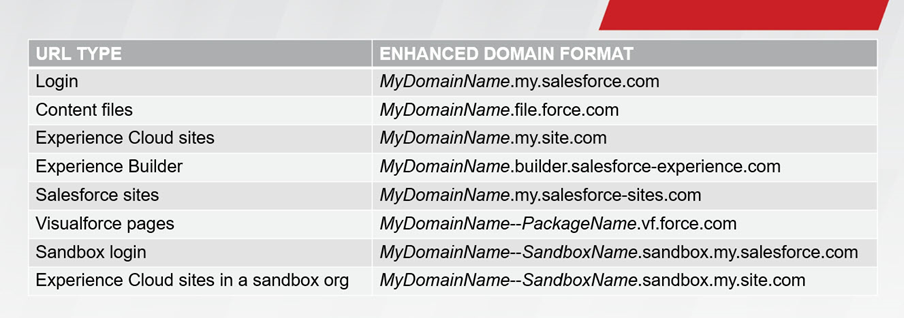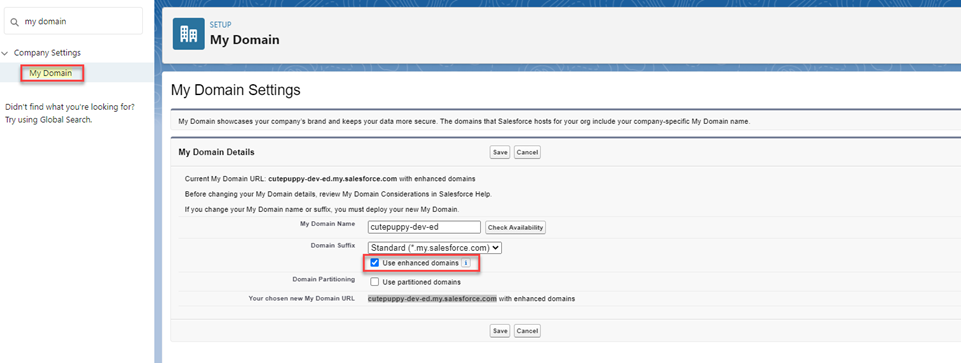Salesforce will start enforcing enhanced domains with the Spring ’23 release (February 2023). Enforcement is being spurred by the way major browsers are starting to handle cookies. To address potential issues, Salesforce is changing the way its domains work.
Review the information below to help your org get ready for Salesforce enhanced domain enforcement.
![]()
What Are Enhanced Domains?
Enhanced domains are the new version of “My Domain.” If your org already uses My Domain, your Salesforce instance is branded with something specific to your company in the URL, e.g., https://mycompany.my.salesforce.com.
With enhanced domains, all URLs across your org contain your company-specific My Domain name, including URLs for your Experience Cloud sites, Salesforce sites, Visualforce pages, and content files. This feature changes domain suffixes (the part after the My Domain name) to meet the latest browser and security standards.
Below is an example of an Experience Cloud site URL and how it changes with enhanced domains:
- Prior to Enhanced Domains – ExperienceCloudSiteSubdomainName.force.com
- After Enhanced Domains – MyDomainName.my.site.com
Here are more examples of Salesforce enhanced domains:

What Are the Benefits?
With enhanced domains, all Salesforce content shares a common domain, so cookies can be shared and browsers can admit access. In addition, the new domain format:
- Complies with the latest browser and security standards
- Carries company-specific branding across sites
- Helps reduce the need for third-party cookies
- Facilitates smoother transitions for org updates when a new instance is created
Enhanced Domains Setup
It is recommended to test enhanced domains in a sandbox org before deploying to your Salesforce (production) org.
Further, if enhanced domains aren’t deployed in your Salesforce org before Salesforce deploys the feature for you, here are some issues that can arise:
- Users can experience issues logging in
- Third-party applications may lose access
- Embedded content may no longer appear
To enable and deploy enhanced domains, follow these simple steps.
First, review example checklists for a My Domain change, including a project checklist, pre-deployment checklist, and post-deployment checklist.
After you’ve reviewed the checklists, go to Setup. In the Quick Find box, enter and select My Domain.
Under My Domain Details, select Edit. Check the box for Use enhanced domains and then select Save.

Next, test login access and workflows in Salesforce. Also, be sure to check any external-facing links, such as publicly available Experience Cloud and Salesforce sites, digital marketing materials, email signatures, etc. You may need to update redirection behavior for your old URLs.
Finally, help your users get started using your new enhanced domain URLs by providing links to pages they use frequently, such as Experience Cloud sites. Encourage them to update any bookmarks they may have.
Enhanced Domains Deployment Schedule
Help your team avoid disruption by getting ready for enforcement.
You may have seen alerts, like the one shown at the beginning of this article or the one below, that indicate with which release your org will be getting enhanced domains. To find the specific dates for when your org will get the release with enhanced domain updates, go to Trust Status, search for your My Domain name, and select your Salesforce instance. Then, select the Maintenance tab. The dates for Salesforce releases will be listed.

If you want to delay deployment, go to Setup. In the Quick Find box, enter and select My Domain. Scroll to the Routing section, click the Edit button, and uncheck the box for Automatically deploy enhanced domains with Spring ’23. Be sure to save your changes.

Below are the releases featuring enhanced domain updates. You can opt out of the automatic deployment for the Spring ’23 and Summer ’23 releases but not for the Winter ’24 release.
Spring ’23 Release – Deployment starts in January 2023 for sandboxes and February 2023 for production orgs. You have the option to opt out of this deployment as shown above.
Summer ’23 Release – Deployment starts in May 2023 for sandboxes and June 2023 for production orgs. You’ll still have the option to opt out of this deployment as shown above.
Winter ’24 Release – Deployment starts in September 2023 for sandboxes and October 2023 for production orgs. There’s no opting out of this deployment.
How Forvis Mazars Can Help
For help with enhanced domains or your Salesforce setup, reach out. The Business Technology Solutions Team at Forvis Mazars has certified experience with Salesforce systems. Use the Contact Us form below to send a message.
